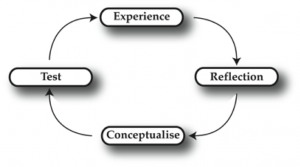Experiential learning and Games
Many theorists propose that we learn from our experiences that is, that effective perception and processing of experiences improves performance.
Merrill suggests that the most effective learning environments have problem solving as their basis. This trial and improvement, problem-solving covers four distinct phases of learning:
- Activation of prior experience;
- Demonstration of skills;
- Application of skills; and
- Integration of these skills into real-world application.[1]
One of the key theorists of experiential learning is David A. Kolb. Kolb developed his experiential model, as opposed to a purer cognitive one, following the influence of Dewey and Piaget[2]. Kolb formally recognised that people learn from experience and described learning as following a cycle of stages:
- Concrete experience
- Observation and reflection
- Abstract conceptualisation
- Testing concepts in new situations[3]
In crude terms, learners have to do something, think about it, pull out its key points and apply them to work or life. In the first, perceptual, half of this cycle learners sense and absorb the information coming from concrete experience and reflect on its significance. During the processing period, learners build cognitive models that can be tested in practice.
Kolb argued that learners can enter this cycle at any point and that learning is a process of repeatedly looping about these four stages. Feedback from the experience becomes key in the refinement of performance and the learner’s ability to apply knowledge in new circumstances.
The experiential view of learning is considered more sophisticated than pure behaviourism or constructivism because it represents a more holistic view of the learner.
However, like constructivism, experiential learning draws on the learner’s personal experience. The role of the facilitator is to encourage learners to address the various stages of the learning cycle.
One of the implications of this is that the role for practitioners is not about teaching specific knowledge or training fixed behaviours, but is one of helping the learner discover approaches that work for them.
Facilitation is about creating and providing space for learners to try out something new, reflect on their experiences, arrive at new conclusions and think about how they would apply these conclusions in their work and life. In this view people learn for themselves with a bit of help and assistance, rather than have it done to or for them.
As with constructivism, the learner is not a passive recipient of learning simply being fed knowledge but is active in its gathering and manipulation.
Typical experiential games include task-based simulations (such as SimCity) or role-play (e.g. The Sims) where players have a given or a chosen goal and must act consistently “in character” to achieve it. The beauty of these “open-ended sandboxes” is that players can experiment and “fail softly.”
In physical role-play, children have been observed to use real objects to create imaginary situations in which they role-played and formulated rules that surfaced naturally during their play [4](Berk, 1995). In the same way, simulations allow for the simplification of systems: they describe manageable chunks of behaviour that learners can absorb. The structure and simplification of environments gives users the chance to parse information more effectively.
Herz (1997: 220) suggests that the circumstances within a simulation are less important than the forces that create them [5]. The “four dimensional building blocks” of moving resources in time do not change the system they merely illustrate the way in which it operates and allowing the user to establish the rules and relationships between elements. The simulation therefore describes environmental processes through graphics, animations and other dynamic media, portraying complex abstract relationships in a more recognisable and intuitive way.
And that is where simulations offer most education value, not product but process: the articulation of rules and relationships – the basis of experiential learning.
[1] Merrill, M. D., (2001), First Principles of Instruction, Utah Sate University, http://id2.usu.edu/Papers/5FirstPrinciples.PDF
[2] McGill, I. & Beaty, L., (1995), Action Learning, second edition: a guide for professional, management and educational development, Kogan Page, London
[3] Kolb, D. A., (1984), Experiential learning: Experience as the source of learning and development, Englewood Cliffs, Prentice Hall, New Jersey
[4] Berk, L. E. & Winsler, A., (1995), Scaffolding children’s learning: Vygotsky and early education, National Association for the Education of Young Children, Washington DC
[5] Herz, J. C., (1997), Joystick Nation, Abacus, London

